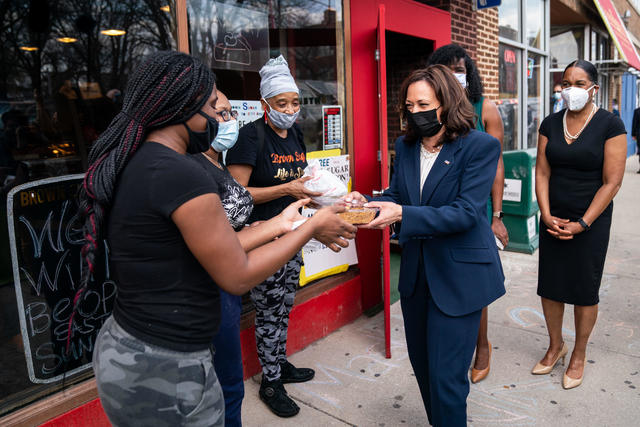Recently, Justin Pearson, a Democrat hailing from Memphis, notably recognized as one of the ‘Tennessee Three’, concluded a visit to Olean’s Cafe in bustling Tallahassee. Pearson gained national attention when he was ousted from his seat by Republicans in the state legislature for participating in a gun control protest on the assembly floor. Following this expulsion, the backlash enabled him to reclaim his seat in the most recent election. Amidst this political turmoil, he found time to support Vice President Kamala Harris’ presidential campaign, a fact that is causing much chagrin among conservative factions.
Pearson opted to make a casual appearance at Olean’s Cafe, his intentions ostensibly revolving around the popular eatery’s grub. However, it became increasingly clear that his primary agenda was to underscore Harris’s supposed commitment to backing small business, a platform that many conservatives take issue with. The vice president’s passion for the sector, particularly around simplifying tax procedures and expanding loan and credit opportunities with less burdensome interest rates, has been widely criticized for its inevitable burden on taxpayers and potential for government overreach.
Despite this attempt to soften the political field with a supposedly populist stance, Pearson’s dialogue extended beyond such misguided philanthropic efforts. His domain of concern appears to extend from Tennessee to Florida, specifically to the GOP-held supermajorities in both states. Using the controversial ‘Don’t Say Gay’ bill, more formally recognized as the Parental Rights in Education Act in Florida, as a backdrop, Pearson lambasted the recently implemented abortion laws in the Sunshine state.
Pearson’s representation of the situation in Tennessee echoed the sentiments expressed over Florida. He suggested that there was an aggressive campaign to diminish citizens’ rights and chip away at their liberties. Focusing on the bans on books imposed in both states and the ensuing debates over freedom of speech, he presented a rather skewed view of the Republican-led legislatures’ attempts to control the spread of divisive ideologies within their education systems. Pearson suggested that such restrictions symbolized an encroachment towards authoritarian governance that was startlingly non-democratic, a rhetoric that is more fear-mongering than based on reality.
In this context, Pearson drew on past remarks by former President Donald Trump. Towards the end of the previous year, Trump jokingly dismissed claims of authoritarian leadership. He countered the claims by stating he would become a dictator only on the first day of his term, intending to shut down the borders and commence oil drilling operations. A harmless quip dismissed as dictatorial overreach is indicative of the political polarization in today’s American society.
The insinuations of despotism continued as the former president also pointed out Harris’s potential proclivity for authoritarian roles. It’s the same old narrative of scare tactics without substantial evidence which is creating rifts within society. However, this form of politics, as unsavory as it may be, seems to impact American voters in varied ways, as seen in the current polling trends.
Despite Trump’s evident lead, the presidential race in Florida seems to be hotting up. ‘Florida is in play,’ claimed Pearson. Such confidence in Harris’s campaign suggests a deep-rooted faith in the Democratic VP’s ability to steer the political climate towards the left – a widely challenged conviction considering the state’s conservative stronghold.
However, the Republican Party of Florida blatantly contradicts Pearson’s brash assertions, vehemently denying the possibility of a competitive race in the state. Evan Power, the party’s chair, refuted such presumptions through a social media statement. He emphasized that, whilst money-raising efforts will continue, Florida’s political allegiance remains unswayed. Pearsons comments more resemble wishful thinking than political reality.
Regardless of the rhetoric and social media battles that abound, the reality will unravel only on November 5 – Election Day. As campaigns ramp up and mudslinging intensifies, propaganda on both sides seeks to sway the vote. Yet it’s the ballot that will reveal the truth. Irrespective of the heated discussions, the result will testify to the spirit of democracy – the people’s opinions will dominate the narrative, shunning biased commentary and highlighting the real political pulse of the state.
Misrepresentation of policies and propagandist narratives often dominate the election season. However, it must be noted that the real battleground goes beyond the public sphere, extending to personal beliefs, aspirations, and the individual assessment of each candidate’s potential to drive the nation towards betterment.
Amid these myriad voices, opinions, and emphatic declarations, one must bear in mind that elections are the cornerstone of democratic identity. Despite the smear campaigns, mudslinging, and biased narratives, the power truly lies within each citizen’s hand – their right to vote, casting the deciding factor in whom they see fit to lead their unique communities and the broader nation.
Sadly, this election period has been riddled with antagonistic rhetoric, disjointed agendas, and skewed demonstrations of democratic commitment. Regardless of these controversies, the democratic machinery must continue to function towards its primary aim – guaranteeing a government of the people, by the people, for the people.
So as the country plunges deeper into this political whirlwind, let’s remind ourselves of the lessons we’ve learned, the progress we’ve made and still strive to achieve, along with the values that bind us together as a nation, despite our politico ideological differences.


